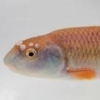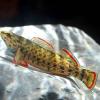I have noticed that if any of my darters die, they die in groups of 3 or more. Are darters sensitive to anything? I just lost 1 rainbow, 1 greenside, 1 logperch, and 2 saffron darters in less than 24 hours. All my other fish seem to be doing fine. About 5 hours before they die they have a white scratch or mark on themselves and then heavily breathing. Then they lose control of their body about an hour before they die. I have this happen every so often in my stream aquariums and I never understood why.

darters sensitivity?
#1

Posted 31 August 2015 - 04:19 PM
#2

Posted 31 August 2015 - 05:49 PM
I know you are in California, could it be temperature spikes in your home for several days in a row?
The member formerly known as Skipjack
#3

Posted 31 August 2015 - 06:21 PM
It has been hot recently. How should I prevent the temperature spikes?
It might be something else since this has happened to me even during the fall and winter
#4

Posted 31 August 2015 - 08:57 PM
sounds like low oxygen to me... darters cant get to the surface to gasp...
#5

Posted 31 August 2015 - 09:38 PM
I just moved my air pump from my 33 to my 150 and the fish look like they love having more oxygen in the aquarium.
#6

Posted 31 August 2015 - 11:54 PM
If you ever need to cool down your aquarium, set up a fan to blow across the surface. It is not the fan itself, but the evaporation it encourages, and, as my high school chemistry teacher told us to never forget, "evaporation is a cooling process!"
#7

Posted 01 September 2015 - 09:51 AM
sounds like low oxygen to me... darters cant get to the surface to gasp...
That's was my first thought too.
Josh Blaylock - Central KY
NANFA on Facebook
KYCREEKS - KRWW - KWA
I hope to have God on my side, but I must have Kentucky.
- Abraham Lincoln, 1861
#8

Posted 01 September 2015 - 04:15 PM
I lost my last logperch today. I think he was too stressed from yesterday to the point he didn't recover fully. How easy is it for people on here to get them?
#9

Posted 01 September 2015 - 08:48 PM
Pretty easy. Let me know when you are ready for some of those other species.
#10

Posted 05 September 2015 - 10:19 AM
I don't know if the deaths are caused by oxygen. So far I have lost: 4 greenside darters, 2 logperch, 2 saffron darters, 1 swamp darter, 1 rainbow darter, 1 southern redbelly dace, and my only killifish. So a total of 12 fish deaths in 4-5 days
#11

Posted 05 September 2015 - 11:42 AM
Yeah, it would seem tough to kill killifish with low O2.
The member formerly known as Skipjack
#12

Posted 05 September 2015 - 04:22 PM
Water parameters?
Tank age?
Tank size?
Has any sort of spray, cleaner, or paint been used near the tank recently?
Any other changes?
#13

Posted 06 September 2015 - 06:49 PM
Water parameters:
Nitrate (N03): 40ppm
Nitrite (N02): 0ppm
Hardness: 200ppm
Chlorine: 0ppm
Alkalinity: 80ppm
Ph: 7.5-8
Ammonia: 0.50ppm
Tank age: I changed 80% of the water 3 weeks ago and put new gravel in, but I kept all my old gravel that has been in there for 2 years.
Tank size 150 gallon aquarium 60" (5ft) X 24" (2ft) X 24" (2ft)
Has any sort of spray, cleaner, or paint been used near the tank recently: Not that I know of.
Any other changes? Nothing really
#14

Posted 06 September 2015 - 08:46 PM
I did a 15% water change yesterday and added hornwort an hour ago. I'm worried about doing too large of a water change since my freshwater sharktooth clam is doing great so far.
#15

Posted 06 September 2015 - 08:48 PM
So happened roughly when you added gravel and did an 80% water change. Any reason that could have caused problems? 80% is a pretty big water change.
The member formerly known as Skipjack
#16

Posted 07 September 2015 - 09:21 AM
I added the gravel and did an 80% waterchange because I was switching fish, the old water was acidic, and I was losing fish.
#17

Posted 08 September 2015 - 08:10 AM
I lost more fish. Here is the total so far.
4 greenside darters, 2 logperch, 2 saffron darters, 4+ swamp darter, 1 rainbow darter, 1 southern redbelly dace, my only killifish, 2 stonerollers, my 2 creek chubsuckers, 1 scarlet shiner, and some others I can't remember
that is 19+ fish...
#18

Posted 08 September 2015 - 08:41 AM
That is a lot of ammonia for fish that typically come from a pristine environment. I'm not saying it's always lethal, but I'm guessing you had a spike for one reason or another. Most fish--our sensitive stream dwellers in particular, usually can't handle a sudden ammonia spike.
My edumakated guess is when you switched out the gravel and pulled out the old stuff, you released all of the toxins produced by the anaerobic bacteria living in the 'sludge' at the bottom......in addition to freeing said 'sludge' that caused your spike. Sadly, one of those things we don't think about until it is too late.
#19

Posted 08 September 2015 - 09:02 AM
That is a lot of ammonia for fish that typically come from a pristine environment. I'm not saying it's always lethal, but I'm guessing you had a spike for one reason or another. Most fish--our sensitive stream dwellers in particular, usually can't handle a sudden ammonia spike.
My edumakated guess is when you switched out the gravel and pulled out the old stuff, you released all of the toxins produced by the anaerobic bacteria living in the 'sludge' at the bottom......in addition to freeing said 'sludge' that caused your spike. Sadly, one of those things we don't think about until it is too late.
I kept the old gravel, but I did clean the old gravel of the sludge and that might have raised the ammonia in the process. I do think it is ammonia though. How can I lower it? I dosed bacteria supplement and I also did 3 10% waterchanges last week. I put some hornwort in recently.
#20

Posted 08 September 2015 - 10:32 AM
What you are currently doing will lower it. However, if there is still a significant amount of sludge decaying in the tank---and not enough nitrifying bacteria to consume the byproducts you will still see elevated levels until their numbers increase.
All of your new, (now dead) fish also contributed to excess organic material by means of food input (by you) and waste output (by them). Even though you had plenty of tank space for all of the fish, the natural biofilter (aka, nitrifying bacteria) weren't abundant enough to handle the sudden increase in bioload. Again, it isn't something everyone thinks about and can happen from time to time. One of the little things we learn while keeping fish!
Don't be disheartened. Next time, just add a few fish at a time, wait a few weeks for the bacteria to catch up......OR.....perform large, and frequent WC's the first few weeks as ammonia can spike over night. I'm a fan of option #1, personally.
1 user(s) are reading this topic
0 members, 1 guests, 0 anonymous users












